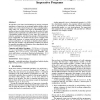1302 search results - page 71 / 261 » Fair Equivalence Relations |
ISCI
2002
13 years 8 months ago
2002
This paper presents a framework for the study of generalizing the standard notion of equivalence relation in rough set approximation space with various categories of k-step neighb...
POPL
2006
ACM
14 years 9 months ago
2006
ACM
We introduce a new notion of bisimulation for showing contextual equivalence of expressions in an untyped lambda-calculus with an explicit store, and in which all expressed values...
EUSFLAT
2003
13 years 10 months ago
2003
In recommender systems, user ratings of items are often represented in terms of linguistic labels such as “fair” or “very good”. We investigate the potential of fuzzy sets...
IMCSIT
2010
13 years 3 months ago
2010
SyMGiza++ -- a tool that computes symmetric word alignment models with the capability to take advantage of multi-processor systems -- is presented. A series of fairly simple modifi...
COGSCI
2004
13 years 9 months ago
2004
This study investigated the roles of problem structure and strategy use in problem encoding. Fourthgrade students solved and explained a set of typical addition problems (e.g., 5 ...

